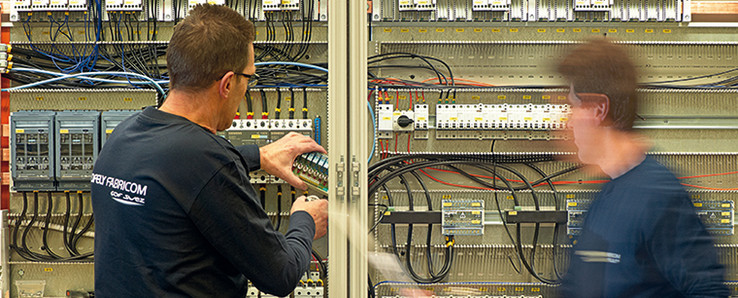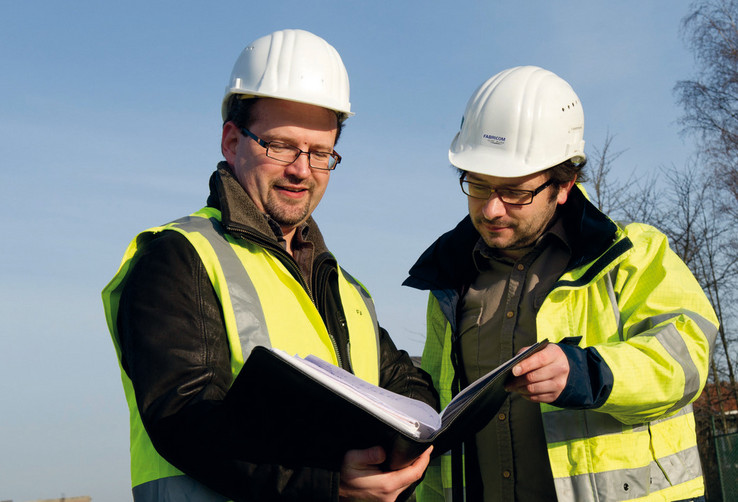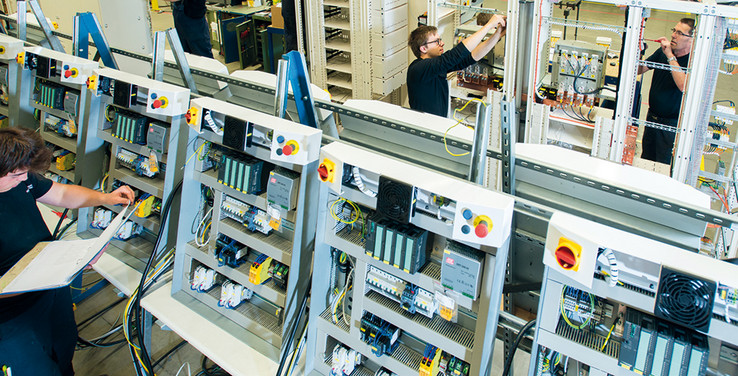Designed to be an engineer
Engie Fabricom is the ultimate reference in terms of innovative, multi-technical installations and services. The group’s expertise includes a wide range of disciplines such as electrical engineering, instrumentation, mechanical engineering, piping, automation and maintenance.
Engie Fabricom is the ultimate reference in terms of innovative, multi-technical installations and services. The group’s expertise includes a wide range of disciplines such as electrical engineering, instrumentation, mechanical engineering, piping, automation and maintenance. This diversification gives additional advantages in the sectors in which the group operates: from infrastructure, buildings, industry and energy to oil and gas. Fabricom was established in 1946 as an SME focused almost exclusively on electrical installations. As from the 50s, the company began to diversify, with the production and installation of pipelines, poles for power lines, nuclear power plants, gas terminal modules... From 1980 onwards, the group embarked on a European conquest with new technologies such as production automation, networks, fibreglass, composites and security installations. Today Engie Fabricom – the adjusted name was established in 2012 – is the leading European expert in the field of technical installations. As part of the GDF SUEZ Energy Services, Engie Fabricom integrates a wide range of multi-disciplinary skills. With more than 5,000 employees these are converted into total solutions for clients from various sectors. The Process Solutions department plays a key role in the field of industrial automation and ICT. In Belgium alone, 150 engineers provide a full service every day: from conceptual design and detailed engineering to project realization and services with a 24/7 standby service.
Continuous symbiosis of ideas
Gert Thys, Business Development Manager: “Process Solutions in Belgium is divided into the North and the South. In the northern section, we employ 80 engineers across our offices in Genk and Zwijndrecht, near Antwerp. Here we develop solutions for automotive, (nuclear) energy, pharmaceuticals, engineering, food and beverages, manufacturing, logistics and cranes. Based on its vast experience, Genk focuses on discontinuous production processes. Zwijndrecht, on the other hand, focuses more on clients with continuous production processes.”
Continuous and discontinuous
“Continuous and discontinuous production processes require a completely different approach,” says Thierry Monsieur, Section Manager Industrial Automation Genk. “In discontinuous processes, we must realize the projects during downtime. This means that the deadlines are very short, which is logical. A production stop will cost our customers a lot of money, and so we must limit the downtime to a minimum. This is also the reason why there is a panel building department in Genk. It’s a matter of running both engineering and panel building simultaneously, in order to shorten the realization time of the project. In contrast, projects in the continuous industry usually run according to a fixed plan, and have a very long and intensive preparation period. They are less hectic, but subject to complex and stringent standards. This brings with it a lot of additional documentation.”
Symbiosis
Thierry Monsieur: “Despite their different approach, Genk and Zwijndrecht work together very closely. Both engineering teams have competences that are complementary and they mutually reinforce each other. The result: a high capacity, a continuous symbiosis of ideas and vast internal knowledge. We like our clients to benefit from this intensive collaboration. In recent years it has resulted in a loyal customer base. Over the years, we have evolved alongside our clients. Where we used to realize mainly local projects, today already 40% of our projects are outside Belgium.”
Focus on the engineer
One of the reasons for this customer loyalty is the unique position of the engineer. Gert Thys: “A dedicated project manager provides a single point of contact for clients. And from day 1 the automation engineer also takes shared ownership. Apart from direct customer contact, he collaborates intensely with other departments with regard to the electrical and mechanical on-site installations. The hardware engineer is also fully involved. He is responsible for all the hardware engineering, which includes the design and informing the panel builder. By participating in on-site I/O testing and commissioning, he is perfectly placed to assess the impact of his design on the different departments.” Gert Thys continues: “Quality is our trademark. It is not only a customer requirement, it is also important to us. In many cases, after the projects have been realized, we also provide the PLC maintenance of the systems. After all, our core business is all about the clients’ technical installations. We need to take away any worries the client might have, and enable him to concentrate on his own core activity: production.”
Great job satisfaction
The central position of the engineers also has a positive effect on the engineers themselves. Thierry Monsieur: “The flat organizational structure, short communication lines, variety of work, direct involvement ... This all translates into a high degree of job satisfaction. As a result, we have a low staff turnover. An additional reason for our excellent staff retention is the fact that we invest a lot in knowledge and in the best possible tools for carrying out the job.”
Towards an EPLAN Certified Company
One of the supporting systems used is EPLAN. “Because we involve our hardware engineers in the projects from the very beginning, EPLAN is an important tool,” says Thierry Monsieur. “Starting from the initial phase, all technical installations are detailed in EPLAN. So it is used from basic engineering right up to final documentation.” Although Engie Fabricom expects all-round knowledge from its engineers, they still insist on one specific specialization. Gert Thys: “In order to validate this knowledge and quality, we aim to be an EPLAN Certified Company. This is why it is important that we have the necessary EPLAN Certified Engineers available. Our internal EPLAN working group is an ideal platform for sharing this knowledge with other colleagues. The group watches over the internal EPLAN standard and the implementation of EPLAN technologies such as EPLAN Electric P8, EPLAN Pro Panel and EPLAN Engineering Center One.” “EPLAN supports this knowledge-sharing. We notice that other Engie Fabricom departments liaise with the working group. Engie Fabricom employs more than 200 trained EPLAN users who, on a daily basis, use more than 50 EPLAN licences.”
Guy Willems, EPLAN Strategic Account Manager for Engie Fabricom “I have noticed that the EPLAN Certified Engineer course gives our engineers extra motivation. For our company this is recognition for our years of investing in people and professional tools.”
Gert Thys, Business Development Manager Engie Fabricom Process Solutions “Because of the many years of experience our hardware engineers have with EPLAN, the system is used intensively. From basic engineering through to detailed design.”
Thierry Monsieur, Section Manager Engie Fabricom Process Solutions Find out more about Engie Fabricom at www.cofelyfabricom-gdfsuez.com.




